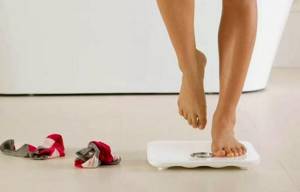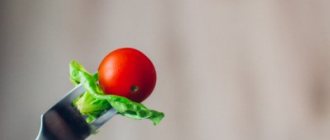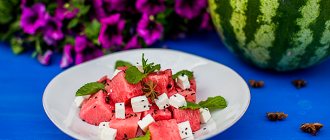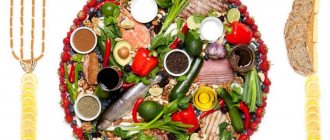Losing excess weight is not an easy task, but maintaining the results can be quite difficult. A strict diet forces you into boundaries that you really want to break.
The need to replenish the body with missing vitamins, minerals, fats, proteins and carbohydrates, which may have been deficient during the weight loss process, can lead to a breakdown and an immediate return of previously lost kilograms.
To avoid this. You need to follow some rules that will help you stay slim even after stopping the diet.
The main rule is that you simply cannot eat what you ate before the diet. Most often, excess weight appears from improper and excessive nutrition. Control the amount of calories and just don’t overeat.
It may be difficult at first, but very soon this diet will become the norm, and the desire to eat something harmful will disappear.
The importance of proper nutrition after losing weight
Nutritionists say that after a diet it is better to eat the same foods that were consumed during the diet, but at the same time gradually increase the amount of food consumed. This is explained by the fact that during the period of weight loss, the human body begins to work in a more economical mode.
Scientists have found that the body temperature of a person who has recently been on a diet becomes slightly lower than normal. Such a slight decrease usually manifests itself in the form of constant fatigue and drowsiness, because the body is forced to save energy.
After losing weight, the human body continues to work for some time in its usual mode, so all the calories that come in excess of those that the body is used to receiving during the diet are put aside “in reserve.”
Loss of muscle mass
We need a certain amount of calories in order for all our organs to function well. We are talking about the heart, brain, liver and other vital organs. Therefore, we need energy to maintain these functions (not just to exercise).
However, when we cut calories (diet), the body doesn't just burn fat stores, it starts breaking down muscle tissue to use as energy. Studies have shown that when we lose weight, we lose a quarter of our muscle mass.

Basic rules of nutrition after a diet
To the question of how to eat after a diet, you can definitely answer that you must follow simple rules:
- maintain portion sizes, do not overload the stomach and do not overeat. After losing weight, your stomach has shrunk, so you shouldn’t stretch it with additional food. It is not so important what to eat after the diet, but what is important is how much to eat after the diet. It is advisable to eat food in small portions, at least five times a day;
- It is important to remember that it will take at least two weeks for the body to get used to regular food. Products that were prohibited during weight loss should be introduced into the diet very gradually, especially sweet and fatty foods. You need to start with very small portions and gradually increase the amount of food over time. The diet after the diet must include a large amount of fruits and vegetables;
- You need to focus more not on how to eat after a diet, but simply listen to your body and not miss the moment of satiety. It is very important to feel when to stop;
- After a strict and long-term diet, it is useful to nourish your body with vitamins by taking them additionally. After the final transition to proper nutrition, additives can be eliminated;
- You can't eat before bed. You can eat your last meal about three hours before bedtime. If you feel very hungry, you can allow yourself a small piece of boiled meat or a small portion of oatmeal cooked in water.
- no matter what you eat after the diet, you should not give up light sports, because after the diet you need to tighten your body muscles;
- when discussing the question of what to eat after a diet, it is important to remember that the most important thing is to maintain a positive attitude, because if the body was able to withstand the diet and achieve results, then it will be able to exit it correctly;
- For the body to function properly, you need to consume at least two liters of fluid daily.
Operating principle
We figured out why after a diet many people not only return to their previous normal so quickly, but also gain extra pounds. But if you eat 50-100 more calories a day, nothing like that will happen to you. Gradually increasing the number of calories will help you fight fat deposits.
They are needed to restore muscle tissue, and this requires more energy than burning fat. Hunger hormones are stabilized, the balance of muscles and fat is restored, resulting in calories being burned more efficiently.

Benefits of exercise
Throughout the experiment, people continued to exercise. For those who preferred to lose weight solely by cutting calories, this method did not help. Therefore, there was only one conclusion: you need to move actively, then the recommendation will be useful.
This is the only condition for losing weight, there is no other recipe. However, if you prefer to exercise and plan to go on a diet, do what the experts recommend. Nowadays, the reverse diet is becoming increasingly popular all over the world.

How not to gain weight after a strict diet. Choosing the right path to losing weight
The most important thing in losing weight is, as you already understood, how you actually lose your weight.
If you force yourself to suffer through strict diets, endless illogical workouts, spending maximum time in the gym or, even worse, using capsules and diet pills, various magic berries and root vegetables, then you will definitely regain your weight and possibly even more.
The thing is that you are not psychologically ready to work for hours in the gym. You'll just die there. And in the end you will say: fuck it...
Sound familiar?
I have seen many people, even those closest to me, who started running a lot from the very first day, and within a day or two everything ended in failure. I have also seen people who go on strict diets and then think about how not to gain weight after this strict diet.
After all, you won’t be able to eat like this all the time. And, if you eat like this for a long time, you will notice how much weaker you have become, you will feel dizzy, and so on. By the way, I strongly recommend that you read the article about what problems arise during low-calorie diets.
It is important to lose weight correctly and healthily, that is, gradually, with the right diet, the right exercises and the right rest.
It's important to make changes to your lifestyle and not just start counting your calories for the day, which will not give you the desired results.
Drinking diet How not to gain weight. Rules
Perhaps the main rule for staying slim after a diet is to find good long-term motivation. Let's say the motivation to go on a diet was a new love affair with a lover of slender women. The novel quickly ended. So why continue to keep yourself in shape?
Or, for example, the diet was followed in order to go to a corporate party in a new super-tight dress. The holiday was successful, and I don’t want to wear the outfit anymore. You can continue to eat at night and give the dress to a slender friend.
So, in order not to gain weight after a diet, you need to write down in a notebook the arguments “FOR” being slim and having a beautiful body. When you want to skip your workout and eat a rich chocolate muffin, all you have to do is read your notes.
When motivation is found and really “works,” it will be much easier to follow further recommendations.
Smart way out
The solution should include gradually adding foods prohibited by the diet to the menu. You need to do this in small portions, trying to control your weight every day. It is important to maintain a drinking regime and not allow yourself too much. Leaving the diet can last up to a month, but on average it takes 7-10 days.
A strict drinking diet, as well as all mono-diets, require particularly careful preparation of the body. Light soups, liquid porridges, vegetables, and lean meat are gradually introduced. Have you gained a little weight? Then you need to slightly reduce the portion and moderate the fervor, stopping the enrichment of the diet.
Important! The main principle is that the stricter the diet, the longer it will take to get out of it.
It is permissible to increase the calorie content of the daily menu by 200 units every 2-3 days in order to prevent the body from starting to “store” fat in case of a future hunger strike. This is especially important after following a strict diet.
A competent gradual exit from the diet will help you get used to the new menu and prevent weight gain.
Nutrition - lifestyle

A healthy diet is meant to become a way of life forever. Any food that reaches the plate must undergo strict control. What to do? Look for new healthy recipes, forget about a generous portion of cutlets with pasta at night and truly love vegetable salads. Proper and balanced nutrition will give you slimness and lightness for many years.
Basic principles of rational nutrition:
- Vegetables should be included in your daily diet. Ideally, they complement every meal in one form or another. Salads, sandwiches, baked and stewed vegetables will enrich the body with fiber and vitamins.
- A hearty protein breakfast is the basis of a balanced menu. Don't skip the good old porridge, scrambled eggs and a slice of hard cheese. You can afford a few shares of chocolate. A proper breakfast will energize you and prolong the feeling of fullness until lunch.
- It is recommended to eat first courses daily. Fatty cabbage soup in pork broth or noodles with lamb are contraindicated. Ideally, eat light soups with chicken, turkey, and beef. First courses prolong the feeling of fullness and allow you to reduce portion sizes.
- Introduce mandatory snacks. Ideally these are fruits. Apples and citrus fruits are especially useful. They increase metabolism and improve your mood. Need a little protein? Choose cottage cheese, a piece of lightly salted salmon or a boiled egg.
- A light dinner is slimness's best friend. The combination of fish and vegetables is perfect. You can afford lean meat and wild rice. Don't overeat at night! Excess calories will definitely make themselves felt by a jump in weight and excess deposits on the sides or buttocks.
- Make it a rule to consume fermented milk products every day. A glass of kefir at night is the principle of Soviet sanatoriums. Sour milk will give you a feeling of fullness and regulate digestion.
- Avoid deep-frying or frying food. Give preference to baking, stewing and boiling. Replace, for example, fried cutlets with oven-baked ones. Fast, helpful and hassle-free!
How not to gain weight after a diet forum. How to avoid gaining weight after losing weight?
Hello girls! I decided that I urgently need to lose weight! I have at least 15 extra pounds.
This is not the first time I have lost weight; before this I already had such attacks. I lost either 3 kg or 8 kg. But the problem is that then I still gain the weight back, even though I try to limit myself in food.
I tried to stay on the right diet and it didn’t work, but I still end up breaking down. I’ve already stopped eating flour and I hardly eat sweets either. But the weight still eventually comes back.
I do sports. But a little. I don't have too much time for this. I'm usually at work late. For the same reason, it is difficult for me to eat properly. Because we don’t have time to go out to eat except lunch.
I was told that if you lose weight suddenly, then the weight quickly comes back, but I not only lost weight quickly, but over the course of six months and still the weight came back. Of course, not immediately, but still.
Dear girls, tell me what to do? What to do to prevent the weight from returning later? Otherwise I want to take on myself, but previous experiences somehow demotivate me.

Cons of a reverse diet
There is only one drawback to this method of losing weight. You need to keep counting calories. For some people, a lifestyle in which food is all they think about is very depressing. This leads to eating disorders and, as a result, overeating. That is, people cannot constantly be in this state and come out of it in their usual way.











